| |
|
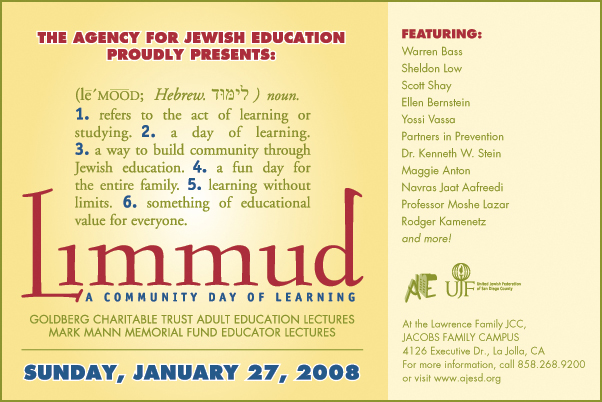

UJF Annual Men's Event
England is the most anti-Semitic country in Europe, Dershowitz tells news media
By Norman Greene
 SAN DIEGO—
The “most virulently anti-Semitic, anti Israeli country in Europe is not Poland, the Ukraine or Russia, it is America’s closest ally, England,” according to author, Harvard professor and defense attorney Alan Dershowitz. An advocate for Israel, Dershowitz spoke at a news conference held before the annual United Jewish Federation’s 2008 Men’s event, held Thursday night at Manchester Hyatt Regency. SAN DIEGO—
The “most virulently anti-Semitic, anti Israeli country in Europe is not Poland, the Ukraine or Russia, it is America’s closest ally, England,” according to author, Harvard professor and defense attorney Alan Dershowitz. An advocate for Israel, Dershowitz spoke at a news conference held before the annual United Jewish Federation’s 2008 Men’s event, held Thursday night at Manchester Hyatt Regency.
Dershowitz, a self-proclaimed liberal who advocates for a two state solution to the Israeli-Palestinian conflict, sees himself as being not only-pro-Israel, but also pro-Palestinian. He thinks a democratic Palestinian state alongside a strong, democratic Israel would be good for Israelis, Palestinians and for the world.
“Many of the people who describe themselves as being pro-Palestinian, are virulently anti-Israel, which means they want to see no Jewish state more than they want to see a Palestinian state,” he said.
The American media, he stated is quite fair to both sides in stark contrast to the European press.
Dershowitz contends that NPR is the most biased medium in American. Most American newspapers get it right, he suggested, singling out the Wall Street Journal and the Boston Globe as well as Fox News for praise. The New York Times is fairly even handed.
“I think the most subtle anti-Israeli bias is found on National Public Radio (NPR).” They give the exact amount of air time to both sides, so it’s not the quantity, it’s the quality. “They would never ask a person like me to comment, I’m too centrist, too pro-Israel. Their scenario is support for Israel is right-wing and support for the Palestinians is moderate. So Hanan Ashrawi is constantly on NPR and she is far from being a moderate. When they allow a pro-Israel speaker, he is always a right winger, a settler, a hardliner. It’s a subtle and insidious scenario that doesn’t do justice to either side and denies listeners an accurate perspective on what is really happening.”
In England, it’s very simple “the media reflects the will of the people.”
“Great Britain today is the single most anti-Semitic country in all of Europe . Who would have ever imagined, saying that in a continent that has Poland and Russia? Anti-Semitism in England is upper class, is pervasive, it dominates higher education (Oxford, Cambridge, the University of London), and it goes up as high as the Royal Family.”
“The BBC is beyond the pale, it doesn’t even try to get it right. They are not the voice of Europe, they are essentially the voice of Hamas. They spent more time on the supposed ‘humanitarian crisis’ in Gaza where no one has died, and virtually no time reporting on the Congo where 24 million people have died.
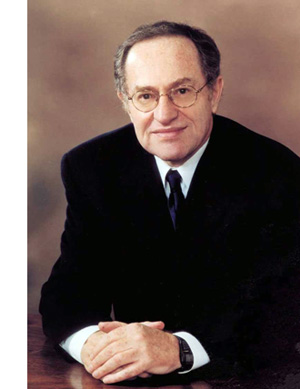 The British press has repeatedly failed to report on genocide around the world, failed to focus on Tibet, Darfur, Congo, Zimbabwe. To them, he contends, Israel is the only violator of international law. “Right now we have China preparing for the Olympics. China is the major supporter of genocide in Darfur, but the British press doesn’t cover that story. You won’t find that story in The Guardian. In fact if you Google ‘genocide and apartheid’ in The Guardian, the only thing you will find is Israel.” The Guardian offers “really, really God-awful reporting.” The British press has repeatedly failed to report on genocide around the world, failed to focus on Tibet, Darfur, Congo, Zimbabwe. To them, he contends, Israel is the only violator of international law. “Right now we have China preparing for the Olympics. China is the major supporter of genocide in Darfur, but the British press doesn’t cover that story. You won’t find that story in The Guardian. In fact if you Google ‘genocide and apartheid’ in The Guardian, the only thing you will find is Israel.” The Guardian offers “really, really God-awful reporting.”
Discussing the British obsession with the illegality of “collective punishment,” Dershowitz asked his audience: “Do you think if Mexico started lobbing missiles into San Diego, that the United States wouldn’t cut off electricity? When an entity like Hamas declares war on a country, all of Gaza is at war and is fair game for retaliation.
“Was it collective punishment when the U.S. bombed Germany, defeated Japan?” he asked. “Then, why is it collective punishment when Israel tries by proportional means to make life a little difficult for the Gaza population?” In his view, it is an attempt to goad the citizens of Gaza to put pressure on their leaders to stop the rocket attacks on civilians in Sedrot and the Southern Negev. Pursuing economic warfare rather than military warfare is preferable. “Economic warfare is totally justified,” he stated.
When asked why Israeli public relations is continually so poor, so reactive as opposed to Hamas p-r, Dershowitz again raised the issue of media bias. First it is easier for a dictatorship to effectively espouse the party line. Israel is a democracy. Secondly, he contends, you have to have someone to talk to and Israel needs a willing recipient in the press, as well as better p-r.
“If a space ship landed in England at the BBC headquarters or at the United Nations, it would go back home reporting that earth is a wonderful world; Syria must be a very lovely place; it is on the Security Council; Libya is now the head of the commission on Human Rights. There is only one bad place on earth, because the BBC and the UN spend such disproportionate time on it, that is Israel.”
Another topic Dershowitz covered in his Q & A session included Iran. He contends that Israel and the United States have a perfect reason to stop Iran’s nuclear ambitions because Iran has publicly stated that it would use the bomb to wipe out Israel. Former Iranian president Akbar Rafsanjani said “he would drop a bomb on Israel and kill 3-5 million Jews, Israel would retaliate and kill 15-20 million Iranians and the trade-off would be worth it.”
Dershowitz contends that “no country that says it would use nuclear weapons aggressively, should have the right to have them.” Israel and the U.S. have the moral right to remove this threat. He said the U.S. has the means, but not the will. The Israelis have the will but not the means.
He also suggested that convicted spy Jonathan Pollard’s sentence should be commuted by President George W. Bush, just as he did Scooter Libby’s. “Not pardoned, because Pollard committed a crime, but he has served over 25 years which is longer than an other man caught spying for an ally.”
Over 900 men attended the dinner discussion in which Dershowitz strongly urged his audience to continue to strengthen Israel and the local Jewish community through support of the United Jewish Federation. The co-chairs for the event were Dan Gardenswartz, Jerry Goldberg and David Kabakoff.
“We have an enormous debt to the past–the struggles of our grandparents, and we have an obligation to the future. Our part of the bargain is to support Israel and to safeguard future generations of Jews at home and abroad.”
Described as the nation’s most “ peripatetic civil liberties lawyer” and “one of its most distinguished defenders of individual rights,” Dershowitz is the Felix Frankfurter Professor of Law at Harvard Law School which he joined at the age of 25 after clerking for Judge David Bazelon and Justice Arthur Goldberg.

THE VIEW FROM JINSA
Should Gaza be made a U.N. protectorate?
By Shoshana Bryen
 WASHINGTON, DC—Gaza looks just about hopeless these days, and indeed, President Bush basically wrote it off while he was in the region. But the problem of Gaza cannot be wished away and we are not comfortable consigning the Palestinians to life behind bars while Hamas takes Iranian money and works on bigger and more precise missiles with which to destroy Israel. Nor are we comfortable with ongoing military incursions and the social service "squeeze" that Israel has been forced into - even though we know the Israelis are doing their very best to limit the humanitarian crisis. WASHINGTON, DC—Gaza looks just about hopeless these days, and indeed, President Bush basically wrote it off while he was in the region. But the problem of Gaza cannot be wished away and we are not comfortable consigning the Palestinians to life behind bars while Hamas takes Iranian money and works on bigger and more precise missiles with which to destroy Israel. Nor are we comfortable with ongoing military incursions and the social service "squeeze" that Israel has been forced into - even though we know the Israelis are doing their very best to limit the humanitarian crisis.
The time has come, we believe, for drastic action and even the President noted the need for "new international institutions" to deal with the problem. We see three options - and surely aren't the only ones who do - none are easy but all are better than what we have now.
First, increase the size of Gaza with long-term land leases in northern Sinai. We know from Israel's experience with Yamit that there is water and arable land. If part of the problem were density and the lack of room for productive enterprise, this would help. It would also give Egypt a stake in the area's stability and future economic growth. An Israeli politician suggested this some time ago as a humanitarian gesture, but Egypt rejected it out of hand - preferring to leave Israel with responsibility for the whole problem. If one believes that radicalism stems from poverty (we don't - there are too many poor societies in which children are not turned into human bombs), this idea should have merit and the U.S. government should use its leverage with Egypt to pursue it.
Second, we repeat our belief that UNRWA should be abolished and the refugees and money (including compensation, if one must) moved to UNHCR with the mandate to resettle people permanently in Gaza or elsewhere. If coordinated with the first idea, and again if one believes that radicalism stems from poverty (and again, we don't) the Palestinians could be given a stake in Gaza that could eventually produce productivity and perhaps economic advancement.
The Third is the most radical and thus the one we prefer. Surveying population and economic growth data for the previous JINSA Report, similarities between post-WWII Singapore and the Gaza Strip emerged. After WWII, Singapore was one of the poorest places in the world, according to the UN, with labor and social unrest, unemployment, and little undamaged infrastructure. It remained a backwater through Malaysian independence in 1963. Ethnic and political trouble between Singapore and Malaysia led to its establishment as a city-state in 1965. Its economic future was bleak as it lost its primary trading partner and its domestic market at the same time.
What did Singapore - or Hong Kong, or Dubai - have that Gaza doesn't have? Only forward-looking entrepreneurial capitalism and rule of law. Oh, well. Don't give up now.
The United States should have withdrawn political support for Palestinian independence in 2006 as a consequence of the Palestinian election, in which the voters chose Hamas, with its platform of the destruction of Israel. It isn't too late. The UN, which feeds, fuels and employs Gaza anyhow, should establish a protectorate over the territory and the people. UN control may have to be established militarily - a not unreasonable international response to an entity bound and determined to erase a UN member.
If the international community is really concerned about the future of the Palestinian people, it should be willing to support a protectorate and the establishment of order and the rule of law. That $7.7 billion the international community just pledged to Gaza for humanitarian aid would go a long way toward establishing real institutions to serve the people. And if the people of Gaza are really interested in their future, they will appreciate the end of refugee status and the restored promise not only of independence, but also of economic stability and advancement.
If they prefer the Hamas recipe for the future, so be it, but then it isn't Gaza that's hopeless.


Palestinians should consider emigrating to lands where there are real opportunities
By Peter Garas
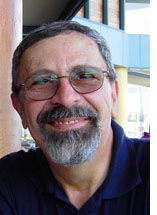 CANBERRA, Australia--Whenever I read the papers about the "Palestinian" situation there is one question I ask for which I have never been able to find a satisfactory answer. CANBERRA, Australia--Whenever I read the papers about the "Palestinian" situation there is one question I ask for which I have never been able to find a satisfactory answer.
"Why is it that of all the people in the world who have been displaced by wars, internal political strife, famine, flood, drought, earthquakes, tidal waves, etc only one group seems to have remained (forgive this next phrase borrowed from a recent article by Shoshana Bryen) 'warehoused' in two strips of land one being Gaza and the other being the so called "West Bank" territories for some 60 years?"
Other groups of people, displaced from their former homes, have not only been permitted, but encouraged and supported through national and international programs to find a haven elsewhere in the world and have also been given the opportunity to make a fresh start in different parts of the world often with radically different cultures, languages, customs and ethnic backgrounds.
Australia is a case in point.
Australia celebrated yet another Australia Day on January 26 and honoured its heroes - those whose contributions to this nation have are and will continue to make it great— it was wonderful to see among those receiving awards and recognition people from all walks of life, all sorts of former nationalities, colours, creeds and cultures.
People from all over the world have successfully resettled here, made a home for themselves, learnt the language, contributed from their cultural heritage to the developing nation that is Australia while having their families, educating them and witnessing their inclusion into the society.
To me it has always seemed a shame that those people who were displaced from their homes and their lives in the former British Protectorate of Palestine are the only group of people in the world who have, by and large, been kept 'warehoused' in so called "Refugee Camps" for some 60 years and have been living on the charity of the world instead of being enabled to find and make a home for themselves where they too can make a new start and become part and parcel of a new society.
I have heard all sorts of stories about why this is the case and of course most have something to do with these people being a group of political pawns at the mercy of larger forces that have shaped Middle East affairs for far longer than the mere six decades since Israel was created.
I can understand the longing to return to the status quo ante by any refugee, why they would want to return to former lives in another time and another place. I can do this because I am one of those who arrived in this nation as a refugee, from Hungary.
Perhaps my parents were never able to get past their dream to somehow reverse history and to find their way back to the "Good Old Days" (if there really was any such thing in their lives) but for those like me who arrived at a relatively early stage in our lives and made the effort to become part and parcel of the place where we were living I can honestly say that a different point of view has emerged.
I am just one person I suspect, among many others, who are proud to call Australia home!
So I return to my question - why is it that there has been for some 60 years a continuing refugee crisis in "Gaza and the West Bank" that does nothing for the people who live there and certainly does nothing for those who live around them.
Trying to turn the clock back to 1948 and waiting for this to happen is, at least in my view, is perhaps the least successful coping strategy that I can think of.
What I would suggest to people who have been penned up in those areas is that they seriously consider moving on and finding for themselves and future generations a new place where they can thrive and prosper. Then perhaps their children can grow up in a place that they will feel happy about calling "home"!


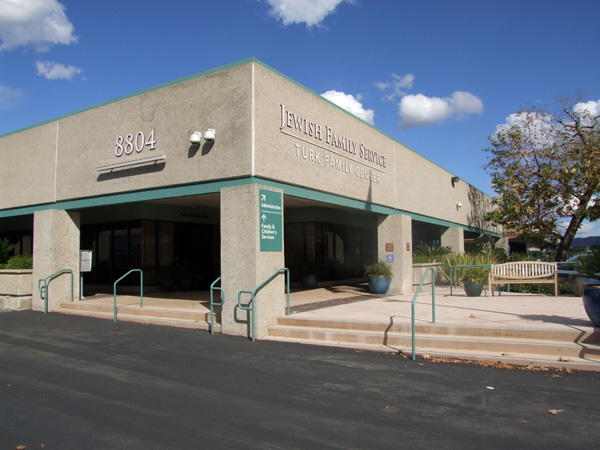
THE JEWISH CITIZEN
JFS programs, including youth-run food pantry, flourish at Turk Family Center
By Donald H. Harrison
(Editor's Note: This is the second in a series about the places associated with four people who will be honored by Jewish Family Service at its March 1 gala at the Hyatt Aventine in La Jolla: Carole & Jerry Turk, Marsha Berkson and Merle Fischlowitz. The four honorees were pictured in the previous story which dealt with the North County Inland Senior Center which Fischlowitz proposed and mentored.)
 SAN DIEGO—Statistics tell some of the story about Jewish Family Service’s move from the Leichtag Family Building in the Hillcrest area to the Turk Family Building in the Kearny Mesa area, but not all of it. SAN DIEGO—Statistics tell some of the story about Jewish Family Service’s move from the Leichtag Family Building in the Hillcrest area to the Turk Family Building in the Kearny Mesa area, but not all of it.
The Leichtag Family Building had 6,600 square feet, and was sold by JFS for $2 million. It had nine on-premise parking spots. The Turk Family Building at 8804 Balboa Avenue has 25,000 square feet, cost $6 million to purchase, gut, and rebuild, and has 93 on-premise parking spots.
Escorting me on a tour of the Turk Family Center, Jill Spitzer, the chief executive officer of Jewish Family Service, noted that having nearly quadruple the space in the new location enabled JFS to close some satellite offices in the San Diego metropolitan area and bring together some 70 personnel in the same place. Each employee has his or her own room or cubicle.
At the same time, Spitzer said, the Turk Family Center better assured the confidentiality of JFS clients who are served by a variety of counseling services. There are separate entrances to the administrative and counseling wings. There is also a third entrance permitting speaking refugees to have their own area.
 On the walls encompassing the administrative departments there are a series of enlarged photographs, letters and memoranda depicting the history of Jewish Family Service from its origins in the early 20th century to the present. A colorful montage of photographs and donor names in the administrative lobby salutes significant contributors, with the lower right corner panel dedicated to the Leichtag Family, whose JFS building in Hillcrest has passed into history. On the walls encompassing the administrative departments there are a series of enlarged photographs, letters and memoranda depicting the history of Jewish Family Service from its origins in the early 20th century to the present. A colorful montage of photographs and donor names in the administrative lobby salutes significant contributors, with the lower right corner panel dedicated to the Leichtag Family, whose JFS building in Hillcrest has passed into history.
Because there was not enough room in at the Leichtag facility, “we had a refugee resettlement program near Beth Jacob (in the San Diego State University area), and whenever something came up, and there needed to be a consultation – it was always a cumbersome, dysfunctional way for staff people to relate to each other.”
Since the move in December 2006, " refugees can come here to the refugee department, and the counseling department is just steps away” Spitzer said. “It has really done wonders for the way the agency provides client services…”
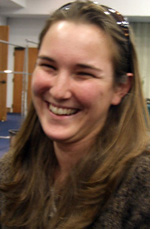 Marissa Palin, who works in the JFS marketing and communications department, echoed Spitzer’s enthusiasm in an interview a day later. Marissa Palin, who works in the JFS marketing and communications department, echoed Spitzer’s enthusiasm in an interview a day later.
“The client confidentiality is a big thing for the case managers,” she commented. “It is a lot easier for them because we now have a separate lobby, and the offices are a little more secluded. Also, they’re now able to always meet their clients in the same office, whereas before that wasn’t always the case. It makes the counselors feel that they can do their jobs a lot better.”
From the administrative point of view, “for the first time accounting and marketing are in the same building as the programs which has a huge impact,” Palin said. “Now if someone needs a flyer rather than having to call us
because we are in another building across the city, they can just walk over.
When the flyer is ready, we can just walk it over to them. It is easy, fast, and a lot more efficient. It makes our job in the marketing department a lot easier, and it makes their job a lot easier too. Communication has escalated incredibly.”
Spitzer said that the morale of the staff, never bad, is increasing. Palin, agreeing, said the phenomenon can be seen in the friendships that are forming among people who work in different departments. With the friendships come greater insight into the needs and capabilities of each other’s programs, Palin said. For example, “counseling now is right next door to Jewish Single Parents,” and the two program coordinators are friends, she said.
“The human resources department has been great in setting up a meditation class and a yoga class on lunch breaks, and we have a massage therapist who comes in every other week and offers a massage during the lunch break,” Palin said. She added that the woman who gives the massages does a wonderful job on shoulders.
There is even talk about forming a JFS softball team, Palin said.
Spitzer emphasized that these various improvements would not have been possible without the generosity of Jerry and Carole Turk, who not only made the lead financial gift for the building but also participated in its design and monitored its reconstruction.
“They were the co-chairs of our campaign cabinet,” Spitzer said. “They were active, vocal , supportive, dynamic. Jerry Turk is an amazing guy; he is an astute business man… He is the guy who built Pala Casino; he knows everything about construction.
“We had a project manager but Jerry came on a regular basis to check things out, to offer his advice, to make sure things were done well,” Spitzer added. “He helped us in the look of the place—the overall image of this place. He was infinitely involved in this and I am grateful for his willingness to spend a lot of time.”
The Turk Family Center enabled JFS to increase the size of its pantry area for its Hand-Up program that provides food for the hungry. The pantry connects by roll-up door to a bay for delivery trucks.
The Hand-Up program
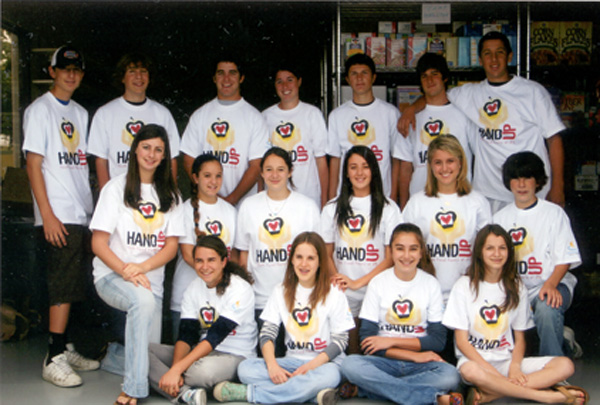
Hand-Up? The program was conceptualized and continues to be led by Marsha Berkson, owner of the Anthology, a combination restaurant and concert venue in San Diego’s Little Italy area. Hand-Up is staffed on a volunteer basis by high school students who collect non-perishable foods, sort it at the pantry, and then distribute packages at various venues, including at Ohr Shalom Synagogue near downtown San Diego to homeless people, and at Camp Pendleton Marine Corps Base to young military families, including those in which young husbands are off to Iraq or Afghanistan and the young mothers are trying to cope with raising two children on her own.
 Max Einhorn, a junior at La Jolla High School, remembered the day he and other students visited the pantry at the beginning of the program, when nothing had yet been collected. He recalled that Berkson told the students that it would be their job to fill the shelves by organizing collection drives at synagogues, schools and other venues. Einhorn decided not only to seek contributions at La Jolla High School, but also at his former school, Soille San Diego Hebrew Day School. He made an appointment with Rabbi Simcha Weiser, the headmaster, who enthusiastically agreed to the drive, urging Einhorn to return with a Power Point presentation to show to the students. He said he made sure there were colorful pictures and simple text to keep the presentation interesting. Plastic bags were distributed to the students with notes inside explaining to parents what the food drive was all about. The payoff? "We had to make several trips between the pantry and the school in order to get all the food there!" Max Einhorn, a junior at La Jolla High School, remembered the day he and other students visited the pantry at the beginning of the program, when nothing had yet been collected. He recalled that Berkson told the students that it would be their job to fill the shelves by organizing collection drives at synagogues, schools and other venues. Einhorn decided not only to seek contributions at La Jolla High School, but also at his former school, Soille San Diego Hebrew Day School. He made an appointment with Rabbi Simcha Weiser, the headmaster, who enthusiastically agreed to the drive, urging Einhorn to return with a Power Point presentation to show to the students. He said he made sure there were colorful pictures and simple text to keep the presentation interesting. Plastic bags were distributed to the students with notes inside explaining to parents what the food drive was all about. The payoff? "We had to make several trips between the pantry and the school in order to get all the food there!"
Shiri Bogomolny, student president at San Diego Jewish Academy, said she and leaders from other participating schools decided upon the "Hand Up" name after considering the Chinese proverb that giving a man a fish feeds him for only one day; teaching him how to fish can feed him and his family for a lifetime.
"We say our program is about a hand-up rather than a hand-out," Bogomolny said in a telephone interview. "When we go to Camp Pendleton, it is not only about giving food; we have fun for the kids, and we have representatives from JFS" to help the Marine families and give them referrals, as necessary, to various social services.
Said Palin: “At each distribution there is a JFS case manager available to talk to clients, to do needs assessment and to determine ways to help them out of their crises by matching them with the appropriate JFS program or programs. So for the clients, the distributions are about more than just receiving food, it’s also the first step in their path toward crisis recovery.”
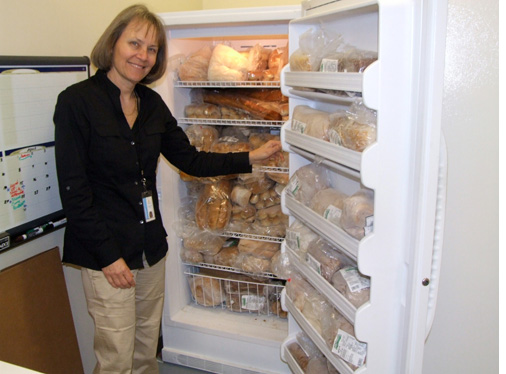 Spitzer said clients sometimes teach JFS workers about the realities of their lives. For example, she said that food packets distributed at Ohr Shalom used to include hard granola bars until a homeless person asked if he might make a suggestion. “Many of us don’t have teeth,” he said. “Is it possible to get softer nutrition bars?” Spitzer said clients sometimes teach JFS workers about the realities of their lives. For example, she said that food packets distributed at Ohr Shalom used to include hard granola bars until a homeless person asked if he might make a suggestion. “Many of us don’t have teeth,” he said. “Is it possible to get softer nutrition bars?”
“The other part of this program that
Marsha has done so well is the whole notion of leadership development,” Spitzer said. “It is not just having these kids doing food drives; what Marsha has done is put together a way for young people to learn how to have a program like this: preparing an agenda, delegating tasks, holding people responsible, learning what things cost, the financial overview, being able to engage other kids. There is so much that goes into this:we are preparing these kids to be the leaders of tomorrow."
“The other thing that we are finding is that a lot of kids involved in this are kids from a privileged background,” Spitzer added. “They are seeing what it means to be poor, to not have enough resources. These teens are seeing a part of our world and our community.”
Agreeing, Bogomolny said: "The most impacting thing is to see how some of those families are… usually when you think of the hungry, you think of the homeless…but families at Camp Pendleton are families that look like all of us, and you wouldn’t expect them to need help. But you learn don’t judge a book by its cover; you can have clothes and a house, and still need a little bit of help. More importantly, these are families of men and women who are fighting for our country. It is sad that they are sacrificing for our country and they don’t have enough to eat…"
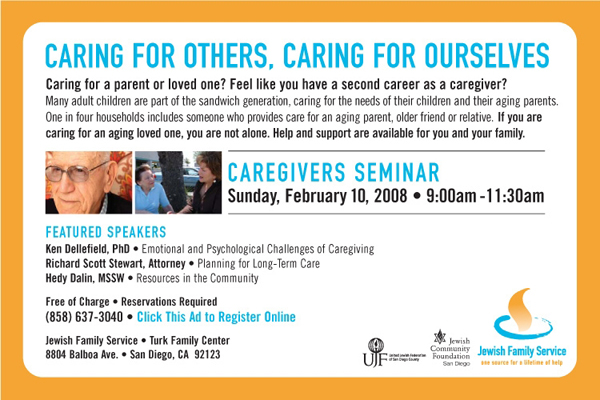

TORAH ON ONE FOOT
Taking our mother's Hebrew name too
By Rabbi Leonard Rosenthal
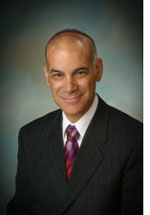 SAN DIEGO—When I received rabbinic ordination from the Jewish Theological Seminary of America I was asked to provide my Hebrew name for the certificate. I wrote Aryeh ben (son of) Yitzchak u’Michal, providing my mother’s Hebrew name as well as my father’s. It was accepted without question and this is the name that appears on my ordination certificate. SAN DIEGO—When I received rabbinic ordination from the Jewish Theological Seminary of America I was asked to provide my Hebrew name for the certificate. I wrote Aryeh ben (son of) Yitzchak u’Michal, providing my mother’s Hebrew name as well as my father’s. It was accepted without question and this is the name that appears on my ordination certificate.
This was not the case with the previous year’s class. Up until then the names on ordination certificates were formulated as Name (son of) Father’s name. Some members of the rabbinical school class of 1979 wanted their mothers’ names included. Their request was met with some resistance from the J.T.S. faculty since it was not "traditional." The students’ wishes prevailed and today almost all ordination certificates includes the names of the rabbi’s mother and father.
In Orthodox circles there is still resistance to including the mother’s name in a Hebrew name. I find this quite curious inasmuch as the convention of using only the father’s name is a custom and not a law. Furthermore, there are times when mothers’ names are used instead of fathers’ names (in a prayer for healing, for example), and given the convention of using matrilineal descent to determine Jewish lineage, it would even seem necessary to include mothers’ names.
There is no question that mothers have equal, and usually more, responsibility raising children. Why should they not receive equal honor and credit within a person’s Hebrew name?
In the most recent parasha Moshe’s father-in-law, Yitro, brings his wife and children to Moses in the desert after the Exodus from Egypt: "So Jethro, Moses’ father-in-law, took Zipporah, Moses’ wife...and her two sons–one of whom was name Gershom...and the other was named Eliezer. . .to him [Moses] in the wilderness, where he was encamped at the mountain of God." (Ex. 182-5)
The Torah here does not refer to Gershom and Eliezer as the sons of Moses but rather as "her sons." This is undoubtedly a tribute to Zipporah’s caring and protecting their children while Moses was engaged in fighting Pharaoh and rescuing the Israelites. The Torah gives Zipporah her due credit.
There has been a great deal of progress on the equalizing of male and female participation in Jewish ritual since the days when I was in rabbinical school (during which time women were not even accepted as rabbinical students). Today the Conservative Movement’s Committee on Jewish Law and Standards writes: "The Committee encourages the use of both parental names whenever Hebrew names are used in ritual contexts." (Minutes of the CJLS)
Today when you are asked for your Hebrew name I encourage you to offer your mother’s, as well as your father’s name. It is a small and modest way we can thank and show our respect for the women who raised us.


AMAZING STORIES OF JUDAISM
When questions of halacha are posed
to embarrass rather than to learn
By Rabbi Baruch Lederman
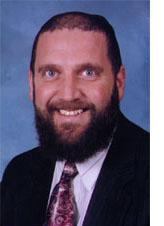 SAN DIEGO—The generation that stood at Har Sinai was the greatest generation of all time. Their leader was the greatest leader of all time. This was not a coincidence. Hashem gives us leaders in proportion to the generation. The greater the generation, the greater the leader. SAN DIEGO—The generation that stood at Har Sinai was the greatest generation of all time. Their leader was the greatest leader of all time. This was not a coincidence. Hashem gives us leaders in proportion to the generation. The greater the generation, the greater the leader.
Young Rabbi Yechezkel Landau, who would eventually become world famous as the Nodeh B'Yehuda, had a challenging beginning to his illustrious rabbinic career. After being appointed rabbi of the great city of Prague, there were men who sneered at the idea of having such a young man hold the mantle of spiritual leadership. They never stopped seeking ways to undermine him.
They once sent a woman to ask the Rabbi a question about the kashrus of a chicken. In those days, stores did not stock prepackaged pre-inspected chickens with a kosher seal. A woman would buy a live chicken and bring it to a shochet (trained butcher) who would slaughter it for her. If there was some question as to the kashrus of the chicken, she would bring the chicken to show it to the rabbi.
Rabbi Landau ruled that the chicken in question was kosher. There was however, a very obscure commentary which discussed this exact case and ruled that such a chicken was rendered unkosher by this particular blemish. Since in those days printed sefarim (books) were very expensive and rare, Rabbi Landau was unaware of that particular ruling. His detractors did have a copy.
The men now used this incident as a springboard to publicly humiliate the Rabbi. They confronted the rabbi with the printed ruling in a most condescending manner.
They arrogantly pointed out that it contradicted Rabbi Landau's decision, all the while intimating that perhaps the venerable Prague community would be better served with a more experienced rabbi at the helm. Everyone present waited for the rabbi to respond.
The Nodeh B'Yehuda thought about the issue and replied, "When a rabbi, who is a competent Torah authority, issues a ruling on a shailah (inquiry), Hashem (G-d) gives him Divine assistance in the merit of the Jewish community which he serves, so that even if he errs in his reasoning, his ruling will wind up being correct. This did not happen with the case at hand. The only logical conclusion is that the shailah was not a real shailah at all, but rather an invented case made up in an attempt to simply vex me. That is why I had no special Siyata D'Shmaya (Divine assistance) - it is only sent from Heaven when the question is real."
The schemers were stunned that the rabbi had seen right through them, and they shamefacedly admitted to their ploy. As a result, Rabbi Landau's public esteem was increased, not decreased, by this spiteful plot.
Dedicated by Dr. Buzz Kaufman in memory of his parents Irvin A. & Mildred M. Kaufman.


SAN DIEGO JEWISH WORLD THE WEEK IN REVIEW
Shoshana Bryen in Washington, DC: Why Gaza finds itself in the mess it's in
Donald H. Harrison in Poway, California: JFS North County Inland Senior Center is a place for physical and mental exercise
Sheila Orysiek in San Diego: Sabbath Amphitheatre: Celebrating Creation in Sequoia National Park
Shoshana Bryen in Washington, DC: U.S. arms for Saudi Arabia not in the best interests of the United States, nor Israel
Carol Davis in San Diego: 'Tranquility' never really comes together
Donald H. Harrison in San Diego: A special artists' view of the Holocaust
Ira Sharkansky in Jerusalem: Yaalon plan ignores Palestinian realitiesShoshana Bryen in Washington, DC: Bush's Middle East trip a disappointment
Peter Garas in Canberra, Australia: Iran vs. Israel, U.S. vs. Russia, making Eurasia increasingly tense, unstable
Donald H. Harrison in San Diego: Documentary examines bar mitzvah of Lior Liebling, enthusiastic student with Down'sJudy Lash Balint in Jerusalem: The many cultures of winter in Israel
Cynthia Citron in Los Angeles: Women’s roles in modern Judaism, Islam and Catholicism topic of Brandeis confab
Peter Garas in Canberra, Australia: South Africa cuts neighbors' power but somehow there is no international outcry
Donald H. Harrison in San Diego: Some spiritual L-DOPA for an aged kibbutz
Ira Sharkansky in Jerusalem: Suffering for its public relations value
Congressman Bob Filner in Washington, D.C.: Former Freedom Rider remembers MLKGail Feinstein Forman Sandi Masori in La Jolla, California: What do you know? I am a Jew after all.Sheila Orysiek in San Diego: Tu B'Shevat: Celebrating the perfection of a tree
< BACK TO TOP
|
|

